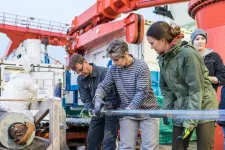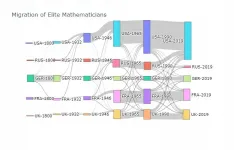INFORMATION:
This research was mainly funded by an Institutional Links grant between Newcastle University and King Mongkut's University of Technology Thonburi (KMUTT), awarded by the Newton Fund via the British Council, and by the Office of Higher Education Commission (OHEC), Thailand. Additional support was provided by UK Research and Innovation.
Read more about how researchers at Newcastle University are developing solutions for water challenges globally https://www.ncl.ac.uk/globalchallenges/water/#projects
Environmental antimicrobial resistance driven by poorly managed urban wastewater
2021-03-30
(Press-News.org) Researchers from Newcastle University, UK, working with colleagues at King Mongkut's University of Technology Thonburi (KMUTT) in Thailand and the Institute of Urban Environment of the Chinese Academy of Sciences, analysed samples of water and sediment taken from aquaculture ponds and nearby canals at five locations in central Thailand's coastal region.
The research, which was part-funded by an institutional links grant awarded by the Newton Fund via the British Council, and which has been published in the Journal of Hazardous Materials, found that the highest prevalence of antimicrobial resistance (AMR) genes was in water from the Hua Krabue canal, originating in Bangkok. Faecal pollution markers were also high in these samples.
In comparison, they found a low number of AMR genes in all of the water and sediment samples collected from the aquaculture ponds.
Aquaculture is the fastest growing animal food production sector globally, and over 91% of global aquaculture is now produced in Asia. The worldwide increase in demand for farmed fish, shrimp and other shellfish has led to the widespread use of antibiotics in aquaculture, and there have been concerns that this is driving environmental AMR, threatening global food production systems.
In recent years, the Thai government has introduced measures aimed at tackling AMR in aquaculture including reducing the amount of antibiotics used in the industry and routinely monitoring antibiotic residues in aquaculture produce.
Dr David Werner, from Newcastle University, said: "We found no evidence that aquaculture is driving environmental AMR. In fact, the data suggests that small-scale aquaculture farmers are complying with Thai government One Health policies to reduce antimicrobial use in aquaculture.
"Wide and regular monitoring of environmental antibiotic resistance with high-throughput diagnostic tools can identify pollution hot-spots and sources to pinpoint the most effective countermeasures. This study provides a further line of evidence for the importance of safely managed sanitation for combatting antibiotic resistance. Currently only around half of total domestic wastewater in Thailand is treated, and our findings have identified an urgent need to improve urban sanitation in the country's coastal aquaculture region, for the protection of global food production systems."
The global spread of AMR is one of the greatest health threats to human, animal and environmental health. Without effective sanitation and adequate treatment of wastewater, bacteria can evolve quickly, increasing resistance to antibiotic medicines.
This has led to fears that so-called superbugs - bacteria that are resistant to all antibiotics - will compromise our ability to combat many new biological infections.
Reducing the spread of AMR is a World Health Organization (WHO) top five priority, and guidance published by the WHO in 2020 provides a framework for countries to create their own national action plans that suit their own particular regional setting. The guidance included contributions from Professor David Graham, also from Newcastle University, and reflects growing evidence, including research by Professor Graham, which suggests that the spread of AMR will not be solved by prudent antibiotic use alone and that environmental factors may be of equal or greater importance.
Professor Graham, who was also part of the team involved with this aquaculture study, said: "The only way we are going to win the fight against antibiotic resistance is to understand and act on all of the pathways that accelerate its spread. Although the types and drivers of resistance are diverse and vary by region and country, there are common roots to its spread - excess antibiotic use, pollution, poor water quality, and poor sanitation.
"This new work is crucial because it exemplifies how inadequate sanitation can affect the food supply, and may be among the strongest drivers of AMR spread."
The work in Thailand is just one example of how experts from Newcastle University are working with scientists from countries including China, Malaysia, India, Ethiopia, Tanzania, and Nepal to track down the sources of waterborne hazards in rivers and their associated food production systems. By working together to carry out comprehensive water quality assessments, they are helping to address the global health challenges of safe water, safe food, and controlling AMR and infectious disease.
ELSE PRESS RELEASES FROM THIS DATE:
In the deep sea, the last ice age is not yet over
2021-03-30
Gas hydrates are a solid compound of gases and water that have an ice-like structure at low temperatures and high pressures. Compounds of methane and water, so-called methane hydrates, are found especially at many ocean margins - also in the Black Sea. In addition to a possible use as an energy source, methane hydrate deposits are being investigated for their stability, as they can dissolve with changes in temperature and pressure. In addition to releases of methane, this can also have an impact on submarine slope stability.
During a six-week expedition with the German research vessel METEOR in autumn 2017, a team from MARUM and GEOMAR investigated a methane hydrate deposit in the deep-sea fan of the Danube in the western Black Sea. During ...
Top business leaders share lessons from the Covid crisis in new report
2021-03-30
Most businesses were ill-prepared to deal with the pandemic and muddled though the challenges stemming from it, according to a report published today.
Resilience reimagined: a practical guide for organisations was produced by Cranfield University, in partnership with the National Preparedness Commission (NPC) and Deloitte. The report presents insights from business leaders from a range of sectors and makes seven recommendations for organisations on how to become more resilient, drawing on lessons from past 12 months.
Cranfield University's Professor David Denyer and Mike Sutliff conducted in-depth interviews and four focus groups with more than 50 C-suite level people (boards, senior executives, policymakers, and resilience directors) from FTSE 100 companies, ...
Social media addiction linked to cyberbullying
2021-03-30
As social media platforms like Instagram, Snapchat, TikTok and others continue to grow in popularity, adolescents are spending more of their time online navigating a complex virtual world.
New research suggests that these increased hours spent online may be associated with cyberbullying behaviors. According to a study by the University of Georgia, higher social media addiction scores, more hours spent online, and identifying as male significantly predicted cyberbullying perpetration in adolescents.
"There are some people who engage in cyberbullying online because of the anonymity and the fact that there's no retaliation," said Amanda Giordano, principal investigator of the study and associate professor in the UGA Mary Frances Early College of Education. "You have these ...
Big data tells story of diversity, migration of math's elite
2021-03-30
Math's top prize, the Fields Medal, has succeeded in making mathematics more inclusive but still rewards elitism, according to a Dartmouth study.
Published in Nature's END ...
Researchers develop new method for identifying mutational signatures in cancer
2021-03-30
Researchers at the Johns Hopkins Kimmel Cancer Center used machine learning techniques to detect mutational signatures in cancer patients. Their algorithm outperformed the current standard of analysis and revealed new mutational signatures associated with obesity, which is believed by cancer prevention experts to be becoming the most significant lifestyle factor contributing to cancer in the U.S. and most of the Western world.
The study was published in the Jan. 25 issue of the journal eLife.
"Mutational signatures are important in current cancer research as they enable you to see the signs left by underlying factors, such as aging, smoking, alcohol use, UV exposure, and BRCA inherited mutations that contribute to the development ...
New COVID-19 research: How to make people follow restrictions without appealing to fear
2021-03-30
Making people fear the coronavirus may motivate us to wash our hands, keep our distance and wear a face mask. But fear also takes a heavy toll on our mental health and is fertile ground for discrimination and prejudice. New research shows a different path.
When the coronavirus pandemic hit the world in the spring of 2020, feelings of being capable or efficacious against the virus were a key factor in driving compliance with the authorities' guidelines. This is the result of a new study based on large surveys across eight Western democracies, published in British Journal of Health Psychology.
The extent to which we personally felt informed and capable of acting clearly affected the extent of our behaviour to prevent infection, e.g. by keeping our distance ...
New early warning system for self-driving cars
2021-03-30
A team of researchers at the Technical University of Munich (TUM) has developed a new early warning system for vehicles that uses artificial intelligence to learn from thousands of real traffic situations. A study of the system was carried out in cooperation with the BMW Group. The results show that, if used in today's self-driving vehicles, it can warn seven seconds in advance against potentially critical situations that the cars cannot handle alone - with over 85% accuracy.
To make self-driving cars safe in the future, development efforts often rely on sophisticated models aimed at giving cars the ability to analyze the behavior of all traffic participants. But what happens if the models are not yet capable of handling some complex ...
Changes in mouth bacteria after drinking beetroot juice may promote healthy ageing
2021-03-30
Drinking beetroot juice promotes a mix of mouth bacteria associated with healthier blood vessels and brain function, according to a new study of people aged 70-80.
Beetroot - and other foods including lettuce, spinach and celery - are rich in inorganic nitrate, and many oral bacteria play a role in turning nitrate to nitric oxide, which helps to regulate blood vessels and neurotransmission (chemical messages in the brain).
Older people tend to have lower nitric oxide production, and this is associated with poorer vascular (blood vessel) and cognitive (brain) health.
In the new study, by the University of Exeter, 26 healthy older people took part in two ten-day supplementation periods: one with nitrate-rich ...
Growing appetite for meat alternatives in Brussels
2021-03-30
Increasing numbers of people in Belgium are turning away from meat in favour of plant-based alternatives, according to new research from psychologists at the University of Bath, in collaboration with Belgian animal welfare organisation GAIA.
New analysis finds that in 2020, over half of Belgians (51%) were 'satisfied' with meat alternatives - a figure that has increased from 44% since 2019.
The results of the research which gauged responses from a representative sample of 1,000 people in Belgium over two years (in 2019 and 2020) highlights concerns around animal agriculture and the environment that are impacting individuals' dietary choices.
Additional findings from ...
The early death of nerve cells is crucial to form healthy brains
2021-03-30
Computer scientists at the University of Surrey have created a ground-breaking model that could improve our understanding of developmental disorders such as autism.
Scientists have long tried to better understand how the cerebral cortex and its layers develop, with pathologies such as autism, schizophrenia and epilepsy linked to this process.
In a paper published by the journal Cerebral Cortex, scientists from Surrey, Newcastle University, and Nottingham University detail how they developed and used a computational model to simulate cell division, cell migration and apoptosis (cell death) in the hope of understanding how these processes affect the development of the brain.
With the help of their computer model, the ...


